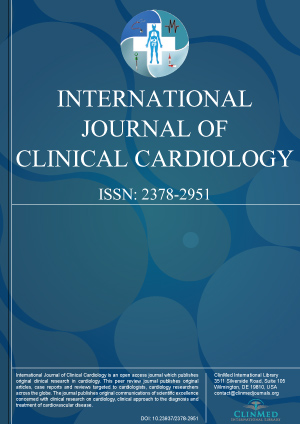Open Access DOI:10.23937/2378-2951/1410068
Electrocardiographic Changes in Primary Hyperparathyroidism
Alexander Alzate, Marcela Munoz Urbano and Kenny Buitrago-Toro
Article Type: Case Report | First Published: December 15, 2015
Electrolytic variability modifies normal structures of segments and intervals on the electrocardiogram (ECG). We present a case that was referred to the Internal Medicine department by the Neurosurgery division for several pathological fractures.The electrocardiogram led us to a diagnostic approach and finally we show how electrocardiographic tracing changed after a treatment implementation. Finally, in this study we highlight the importance of an electrocardiogram on a patient's approach....
Open Access DOI:10.23937/2378-2951/1410067
Recurrent Thrombus Formation in Left Ventricle with Preserved Systolic Function
Mustafa Yilmaztepe, Fatih Mehmet Ucar, Gokay Taylan, Hanefi Yekta Gurlertop, Volkan Yuksel, Suat Canbaz and Serhat Huseyin
Article Type: Case Report | First Published: December 12, 2015
A 48 years old male patient was referred to our clinic for intraventricular mass, detected incidentally during non-cardiac preoperative evaluation. The medical history of the patient was unremarkable except suspicious history of heart attack four years ago. Physical examination was normal. ECG showed normal sinus rhythm 76 beats per minute. Echocardiographic examination (Figure 1) revealed isodense mobile mass attached to left ventricle apex, moving in every systole towards the left ventricle o...
Open Access DOI:10.23937/2378-2951/1410065
Effectiveness of Cardiac Rehabilitation in Increased Left Ventricle Ejection Fraction and Cardiovascular Secondary Prevention
Lopez-Aguilera J, Suarez de Lezo J, Mazuelos-Bellido F, Suarez-de-Lezo Jr, Casado-Adam P, Heredia-Torres MA, Mayordomo-Riera FJ and Cano-Lliteras MP
Article Type: Research Article | First Published: December 10, 2015
Prospective observational before-after study in the Cardiac Rehabilitation Unit of Cordoba (Spain) between March 2013 and June 2014 during phase 2 of cardiac rehabilitation program (CRP). Demographic variables, LVEF, functional capacity and biochemical parameters were analyzed. Outcome variables at the beginning and end of the treatment were compared using the paired student t-test. In addition, a multiple linear regression analysis was completed to identify the variables related to the increase...
Open Access DOI:10.23937/2378-2951/1410064
Ambiguous Left Ventricular Outflow Tract Obstruction: The Key Role of the Cardiac CT-Scan
Marie-Philippe Verge, Geraldine Allain, Luc-Philippe Christiaens and Guillaume Lucas
Article Type: Case Report | First Published: December 09, 2015
Subaortic membranes are uncommon causes of left ventricular outflow tract obstruction. Combined subaortic membrane and aortic valve stenosis is even more rare and can be challenging for echocardiographic diagnosis. A 58 year old woman, known for symptomatic aortic stenosis was referred to our hospital department for dyspnoea. Her most important medical history was aortic coarctation surgery at the age of 13 without any significant event since that time. The trans-thoracic echocardiography showed...
Open Access DOI:10.23937/2378-2951/1410063
Diagnosis of Stress-Induced Cardiomyopathy in a Patient with an Abnormal Myocardial SPECT Imaging
Teo Tee Yin Tracy, McNeely Parren, Demetroulis Elaine, Staffey Kimberly and Graham Michael
Article Type: Case Report | First Published: November 30, 2015
We present a case of stress-induced cardiomyopathy in a 66 year old male precipitated by electroconvulsive (ECT) for catatonia related to severe recurrent depression. Patient suffered from decades of bipolar syndrome with severe depression that is refractory from medication therapies. As the frequency of the recent admissions increases, the patient's guardian consented to ECT to treat his depression. During the ECT procedure, he developed non-sustained ventricular tachycardia (NSVT). The onset o...
Open Access DOI:10.23937/2378-2951/1410062
Early Recurrence of Myocardial Infarction in a Young Female caused by Left Main Coronary Artery Thrombosis
Silvio Nocco, Laura Concas, Daniele Congiu and Rinaldo Aste
Article Type: Case Report | First Published: November 30, 2015
A young female, cardiovascular risk factors free, was admitted to the coronary care unit for a sub-acute myocardial infarction caused by a critical ostial stenosis of the left anterior descending artery, treated with coronary angioplasty and insertion of two drug-eluting stents. Despite the administration of aggressive treatment, just 5 days after discharge, the patient was readmitted for early recurrence of myocardial infarction caused by left main coronary artery thrombosis treated with emerge...
Open Access DOI:10.23937/2378-2951/1410061
Serum Omentin-1 Concentrations and Biochemical Markers of Chronic Subclinical Inflammation in Obese Subjects
Eman M Alissa, Maisa'a M Al-Salmi, Nabeela Alama and Gordon A Ferns
Article Type: Original Research Article | First Published: November 21, 2015
Background: Whilst chronic subclinical inflammation is now considered to be a predisposing risk factor of cardiovascular diseases. The extent by which adipokines induce metabolic abnormalities in humans is not fully resolved. The purpose of this study was to examine the relationship between insulin resistance and serum inflammatory markers in obese subjects. Methods: One hundred and five subjects without any clinically evident CVD were classified into 3 coronary risk levels according to Framingh...
Open Access DOI:10.23937/2378-2951/1410060
Brugada Syndrome; Cause of Syncope during Transcutaneous Electrical Nerve Stimulation Therapy
Abdulmelik Yildiz, Mustafa Budancamanak and Cennet Yildiz
Article Type: Case Report | First Published: November 20, 2015
38 year old male patient with preauricular abcess developed presyncope during high-grade fever and diagnosed as having Brugada syndrome with type 1 ECG pattern. The diagnosis of Brugada syndrome was made in educational and research hospital. His Electroencephalography (EEG) was normal. Coronary angiography showed myocardial bridging of the left anteriyor descending coronary artery after second diagonal branch and no hemodynamically significant coronary artery disease. Technesium (TC99 MIBI) Myoc...
Open Access DOI:10.23937/2378-2951/1410059
The Psychological and Compliance Factors can Modulate the Outcome of STEMI Patients Treated by Stem Cell Therapy - A Pilot Study
Miruna Mihaela Micheu, Oana-Maria Udrea, Nicoleta Oprescu, Alina Ioana Scarlatescu, Daniela Pitic, Lucian Calmac and Maria Dorobantu
Article Type: Research Article | First Published: November 13, 2015
In the assessment of stem cell therapy post myocardial infarction, the rapport between the medical intervention and the patient's compliance and psychological factors represent a research and treatment management challenge. Purpose: Identifying the implication of psychological and behavioral factors associated with compliance on therapeutic success in relation to cell therapy in acute myocardial infarction patients....

